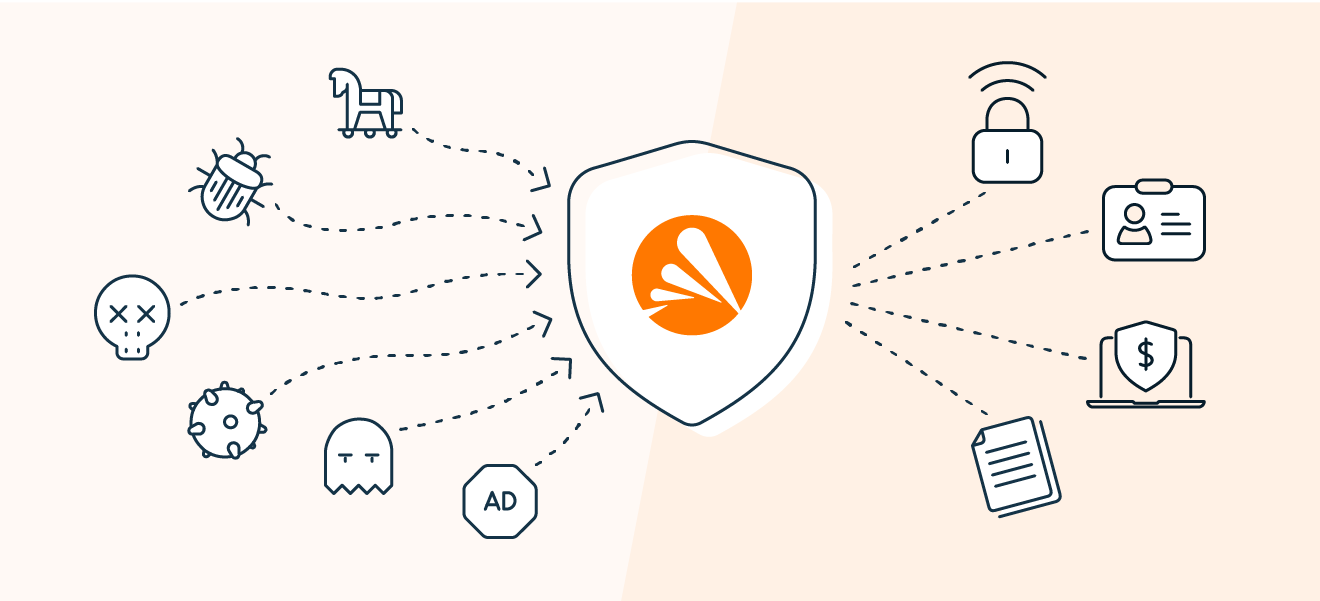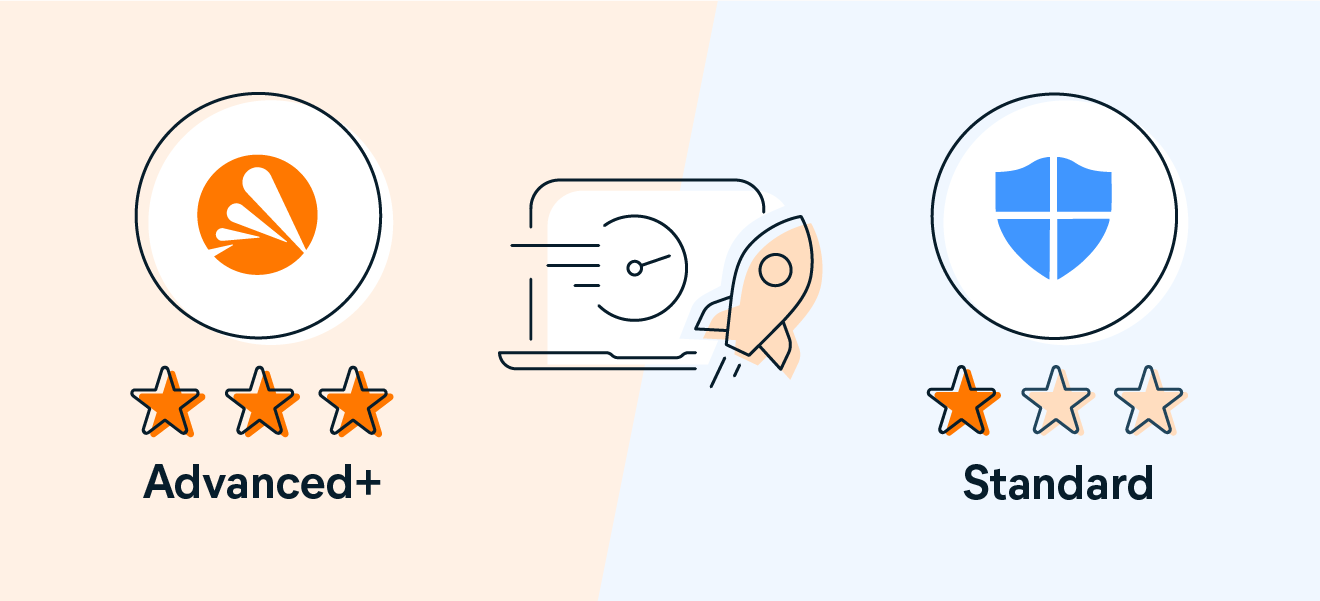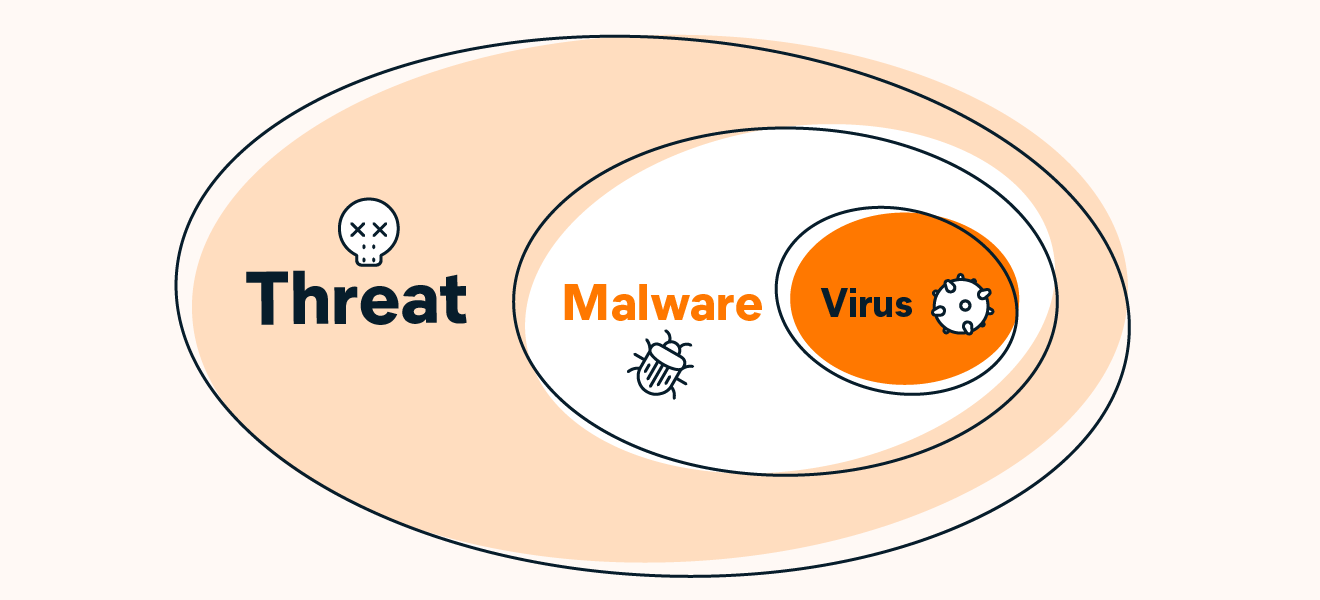Protect your Android against viruses and malware with Avast One
- Security
- Privacy
- Performance
Windows 10 (and Windows 11) includes a free antivirus application that promises to protect your computer against malware, but is Windows Defender good enough to keep you totally safe? In some cases, it might be — but you’ll get more comprehensive protection with dedicated security and privacy tools. Read on to learn what Defender does well and where it falls short, and why you should strengthen your online defenses with privacy and security software like Avast One.

Windows Defender — now known as Microsoft Defender — is an anti-malware program that is built into Windows 10 and 11. It is freely updated, no annual subscription is needed, and it’s backed by Microsoft.

This Article Contains:
Historically, Microsoft has offered Defender as a backup to full-suite security products like Avast One. Avast works closely with Microsoft as a top partner in the Microsoft Virus Initiative (MVI), with both companies collaborating to test each other’s anti-malware tools.
If you have an antivirus product installed, Windows Defender switches to standby mode while your primary tool gets the job done. Otherwise, without a recognized antivirus program, Windows Defender steps up and assumes the role of primary security application. Without question, Windows users have always needed an application to protect against computer viruses, spyware, and other types of malware.
It's not that Windows is especially prone to viruses or that Windows is an unsecured operating system. Microsoft has done an excellent job of locking it down, reducing the attack surface — the total amount of attack vectors, or opportunities — and responding quickly to serious security breaches. Windows is the target of malware writers because it commands more than 90% of the desktop PC market.
It's like the old saying attributed to bank robber Willie Sutton, who said he robbed banks because that's where the money is. If you want to steal bank login credentials, you go after Windows users.
Now under the name Microsoft Defender, Windows’ out-of-the-box antivirus application is only available on Windows 8, Windows 8.1, Windows 10, and Windows 11 computers.
But the same software utility has been available for several years. For Windows XP, the software was released as Microsoft Security Essentials. You may also have encountered it under that name in Windows Vista and Windows 7. While the application was not built into those operating systems, it was available as a free download.
The original Windows Defender was an anti-spyware program on Windows XP, Windows Vista, and Windows 7, and Microsoft Security Essentials was created to fill in the gaps. Now, Windows Defender is back as a full-fledged antivirus tool. But is it good enough to protect your PC?
The latest version of Windows Defender — the one built into Windows 10 and 11 and redubbed Microsoft Defender — is billed as a full antivirus solution. It promises real-time protection and browser integration to protect you from malicious websites. Windows Defender also scans your Outlook mailbox for suspicious attachments.
For a long time, Microsoft Defender was a serious laggard in comparative tests by AV Test, the gold standard in antivirus evaluation. In the past year, when it comes to standard antivirus detection, Microsoft closed the gap with the subscription-based anti-malware products.
But the key word is “standard.” Microsoft Windows Defender provides standard, baseline protection against well-known virus and malware strains. But it's missing additional features now common in many third-party antivirus solutions — like dynamic analysis, deep-screen threat detection capabilities, an intrusion detection mechanisms, behavioral shields, CyberCapture, and more.
For truly comprehensive protection against unknown virus strains, new malware techniques, and other web threats, you’ll need to use a full-featured security and privacy suite like Avast One.
In addition to preventing and removing viruses and other kinds of malware, Avast One protects against a host of other online threats — such as phishing scams, Wi-Fi sniffing, scareware, adware, and other scams and cybercrimes.
In today’s rapidly evolving threat landscape, online security is no longer limited to fighting viruses. Avast’s smart analytics capabilities and extensive suite of built-in, intelligent security and privacy features — including a file scanner, a VPN, data-leak monitoring, and anti-ransomware tools — ensure you’re protected against the wide variety of security and privacy threats out there.
 Avast One protects your data and devices against a wide range of security and privacy threats.
Avast One protects your data and devices against a wide range of security and privacy threats.
As a comprehensive digital lifestyle tool, Avast One goes way beyond traditional notions of antivirus security to protect your privacy and boost your computer’s performance, all in one free app.
Windows Defender has come a long way over the years, but it’s still struggling to redeem itself against the dubious reputation it's earned through years of subpar protection and performance. Now, Windows Defender test results have improved in many independent antivirus tests — including strong scores in Protection, Performance, and Usability in AV Test’s latest round of evaluations.
Given scores like these, you might be wondering just what it is that’s continuing to hold Windows Defender back. Sometimes, it seems like Microsoft’s worst enemy is itself — more than once over recent years, Windows updates have caused severe bugs that have hampered Microsoft Defender’s ability to protect its users.
If something like this happens again, you’ll want a more reliable antivirus solution — one that isn’t as dependent on Microsoft’s software and quality controls to keep you safe. The good news is that there are plenty of free antivirus options out there: when comparing Windows Defender vs. Avast, Windows Defender vs. Bitdefender, or Windows Defender vs. AVG, the third-party solution often comes out on top.
Though Windows Defender has improved its performance in recent years, it's not without limitations.
In many security and performance reviews, Windows Defender test results return many more false positives than leading third-party alternatives. This means that it’s more likely to mistakenly identify a safe program or file as malicious. You’ll need to whitelist that bit of software so that Windows Defender realizes it’s safe.
It also can fail to detect a lot more malware than its competitors, especially when it’s disconnected from its cloud database. Malware detection and prevention are two different things: detection is what identifies a file as malicious, and prevention stops it from affecting your computer. Malware detection is important because it can prevent you from inadvertently passing malicious files onto your contacts, even if they don’t execute on your device.
In a recent AV-Comparatives malware test, Windows Defender detected only just over half of all malware samples, while Avast detected 93.4%.
An AV-Comparatives malware test from March 2021 found that while offline, Windows Defender detected only just over half of all malware samples, while Avast detected 93.4% of offline samples. Avast also narrowly edged out Windows Defender in the online detection test, with a rate of 96.3% to Microsoft’s 95.9%.
Still, strong malware detection is a crucial element of strong and comprehensive computer security. Windows Defender can also struggle to keep up with third-party tools in detecting web browser–based phishing attacks, according to PCMag.
Windows Defender also lacks a centralized logging and alerting system. It’ll inform you about malware events on your computer, but you can’t get an idea of the bigger global picture. If there’s a new strain of malware sweeping the globe, Windows Defender won’t tell you about it until it reaches your machine.
This means that you might not always be aware of new threats or protected against them. And if your computer comes down with a new or unknown infection, you’ll need to use another tool to remove the malware from your PC.
Windows Defender targets only standard malware strains and exploits while also providing basic web browser and email protection. Windows Defender lacks comprehensive anti-malware capabilities, especially against new and emerging threats. Though its anti-malware capabilities have improved in recent years, it didn’t quite match Avast in AV-Comparatives’ 2020 year-end roundup.
Another downside is you have to use Windows Update to manually download new definitions — database entries of new viruses so that Windows Defender can detect them. All of the major antivirus programs automatically update themselves in the background, usually multiple times a day, protecting you against new threats as they emerge.
These limitations aside, Windows Defender’s malware prevention capabilities are comparable to those of its competitors. You’ll be significantly safer with it than without it on your side.
While Windows Defender will protect you against some malware attacks as well as browser-based threats in Microsoft Edge, it’s not designed to handle all aspects of your digital lifestyle. But Avast One gives you the tools you need to protect your personal data and keep your PC in top shape.
Free VPN access means that you can encrypt your entire internet connection to hide your IP address and secure your data against online snoops. And the patented Sleep Mode snoozes background programs and activity to save on computing power and speed up your PC.
So how does Windows Defender compare against Avast One? Windows Defender handles the basics pretty well. It runs various types of scans, checks file downloads, and comes with a firewall. It also allows you to protect chosen folders from ransomware attacks — a feature offered at a premium by some third-party antivirus providers.
Meanwhile, Avast One has a wide range of advanced security and privacy features that combine for 360-degree protection, including:
AutoSandbox analyzes files in isolation for 15 seconds to make sure they’re safe.
CyberCapture forwards downloaded files to Avast for detailed threat analysis.
Behavioral Shield watches your software for any signs of a malware infection.
Web Shield and Mail Shield protect you against threats in your network traffic or inbox, including phishing and spoofing attacks.
In addition to its top-rated security and antivirus protections, Avast One also outfits you with VPN access and data leak countermeasures — keeping your personal data private on multiple fronts. In this Windows Defender vs. Avast matchup, it’s Avast that’ll keep you safer.
Avast is also less demanding on your computer’s resources, according to AV-Comparatives’ April 2021 performance test. Avast’s antivirus solution was shown to have significantly less performance impact than Windows Defender, with a 3-star “Advanced+” rating compared to Microsoft’s 1-star score of “Standard.” No one wants an antivirus program slowing down their system.

Avast One is the ultimate way to detect viruses, malware, and other threats on a Windows system. Plus, its built-in privacy tools will ensure your personal data stays out of the wrong hands.
Windows Defender is good enough if you use the internet minimally, and if you rely only on Microsoft's own tools. (Occasionally, malware is passed along via a USB drive, but the vast majority of infections come from internet activity.)
Windows Defender is also good enough to serve as a backup should your antivirus subscription run out and you are unable to renew. That is Windows Defender's role: It's a backup in lieu of a proper antivirus product.
For more extensive browsing and internet protection, especially if you use sensitive personal data when you shop or bank online, you need a third-party antivirus tool to provide more comprehensive protection. When you enter personal data online, you’ll be much more secure when you encrypt your data with a free VPN — one of many useful tools you’ll find in Avast One.
Remember, standard viruses and standard malware aren’t the only thing to watch out for — unknown or new malware strains, phishing scams, and other threats can compromise your privacy and security.

It's nice to know Microsoft has your back, but Windows Defender should always remain a secondary option. It's there if you need it, but only as a temporary stopgap. Avast One has a much bigger and broader threat-detection network — and a wealth of built-in privacy features — protecting you against a wider variety of current threats than Windows Defender.
With Avast One, you’re covered against the full spectrum of viruses and malware along with many of the most common infection vectors — Wi-Fi vulnerabilities, misbehaving or out-of-date software, phishing attacks, and more. These are just some of the many ways Avast protects the privacy and security of over 400 million people around the world.
Download free Avast One for comprehensive, real-time threat protection on your Windows PC.
Download free Avast One for comprehensive, real-time threat protection on your Windows PC.
Download free Avast One for comprehensive, real-time threat protection on your Windows PC.
Download free Avast One for comprehensive, real-time threat protection on your Windows PC.
Protect your Android against viruses and malware with Avast One
Protect your iPhone against malware and data leaks with Avast One